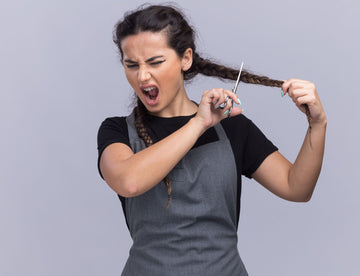
Causes for Hair Fall:
People typically lose 50 to 100 hairs a day. This usually isn't noticeable because new hair is growing in at the same time. Hair loss occurs when new hair doesn't replace the hair that has fallen out.
Hair loss is typically related to one or more of the following factors:
- Family history (heredity).The most common cause of hair loss is a hereditary condition that happens with aging. This condition is called androgenic alopecia, male-pattern baldness and female-pattern baldness. It usually occurs gradually and in predictable patterns — a receding hairline and bald spots in men and thinning hair along the crown of the scalp in women.
- Hormonal changes and medical conditions: variety of conditions can cause permanent or temporary hair loss, including hormonal changes due to pregnancy, childbirth, menopause and thyroid problems. Medical conditions include alopecia areata which is immune system related and causes patchy hair loss, scalp infections such as ringworm, and a hair-pulling disorder called trichotillomania.
- Medications and supplements: Hair loss can be a side effect of certain drugs, such as those used for cancer, arthritis, depression, heart problems, gout and high blood pressure.
- Radiation therapy to the head: The hair may not grow back the same as it was before.
- A very stressful event: Many people experience a general thinning of hair several months after a physical or emotional shock. This type of hair loss is temporary.
- Hairstyles and treatments: Excessive hairstyling or hairstyles that pull your hair tight, such as pigtails or cornrows, can cause a type of hair loss called traction alopecia. Hot-oil hair treatments and permanents also can cause hair to fall out. If scarring occurs, hair loss could be permanent.
How to control hair fall?
- Maintain a nutritious diet: A diet rich in vitamins and minerals, notably biotin, iron, and vitamins C and D, can promote hair health and minimize hair loss.
- Reduce heat styling: Heat styling products, such as blow dryers, flat irons, and curling wands, can cause hair damage and hair loss. Use a heat-protectant spray to lessen damage or attempt to limit their use.
- Avoid harsh chemicals: Chemicals such as bleach and dyes can damage hair and cause hair loss. Use them sparingly or opt for milder alternatives.
- Manage your stress: high amounts of stress can cause hair loss. Reduce your stress levels by employing stress-management practices, such as yoga, meditation, and physical activity.
- Massaging your scalp helps increase blood flow to the hair follicles, hence encouraging hair growth and decreasing hair loss.
- Utilize a delicate brush: brushing your hair too roughly might trigger hair loss. Use a soft brush, such as one made of boar bristles, and avoid combing your hair when it is damp.
- Get frequent haircuts: Regular haircuts can help eliminate split ends and prevent hair breakage, which can lead to hair loss.
Foods to consume to prevent Hair Fall:
- Omega-3 fatty acids in salmon promote hair growth and prevent loss.
- Eggs contain biotin, essential for hair health.
- Spinach is rich in hair-growing vitamins A and C.
- Almonds and walnuts include biotin, vitamin E, and healthy fats, which are good for hair.
- Sweet potatoes contain vitamin A from beta-carotene. Vitamin A helps hair grow.
- Healthy hair needs zinc, which oysters provide.
- Turkey and chicken are high-protein sources for hair growth.
- Protein and biotin in Greek yoghurt promote hair health.
Supplements for healthy hair and reduce hair fall

- Vitamin D: Vitamin D is essential for healthy hair since it aids in the body's absorption of calcium, which is required for strong, lustrous hair development.
- Iron: Lack of iron may cause hair loss, thus it is essential for keeping healthy hair.
- Omega-3 fatty acids: By giving the hair follicles vital nutrients, omega-3 fatty acids may help increase the health of the hair.
- Zinc: Zinc is essential for healthy hair since it helps keep the oil-secreting glands on the scalp functioning properly.
- Vitamin C: Vitamin C is crucial for healthy hair since it aids in the body's production of collagen, which is required for strong hair development.
- Supplements should be used with a balanced diet under medical supervision. It's vital to follow supplement dosages since too much might be harmful.
Tags:




